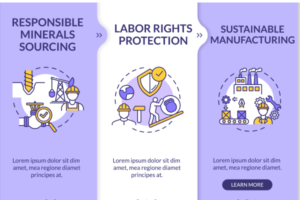
Business ethics is a discipline on its own which branches into many different sub-disciplines. At its core, it refers to the principles and values which act as guidelines for how one conducts business. This branches into how one makes decisions, what products or services you choose to use, how you treat your staff, and more.
Having good business ethics can influence whether your customers return, recommend your business to others, and the culture you create internally. Bad business ethics can potentially impact your brand negatively. A branch of business ethics which can particularly impact your public brand perception is that of ethical sourcing and supplies.
The most common and easy to understand example of ethical sourcing is that of big clothing brands who come under fire for sourcing their clothing from ‘sweat shops’ that conduct human rights abuses, such as in Africa or Asia where workers are underpaid, child labour is rife, and working conditions are putrid. Still, in 2021, brands such as Adidas, GAP, Nike, Zara and more are being accused of unethical business due to their continuing use of ‘sweat shops’ and discriminatory labour. The result for these companies is a tarnished reputation, boycotts which fluctuate, and human rights violations.
Ethical sourcing therefore means that at any point in your supply chain management, your supplier and the product being supplied to you is not associated with, or does not conduct and create their supply in an unethical manner. This, among other things, means that their business processes do not violate any workers human rights, conduct business illegally, discriminate against any particular group identity, involve itself or fund a group or cause which commits human rights abuses, cause harm to the environment, and more. Essentially, if your supplier, or the means by which you are sourcing labour and raw materials, is unethical in any manner, that makes your business, by association, complicit in unethical practices.
Let’s break down some more examples which we are familiar with. A common source of ethical contention are businesses which are linked to Israel, because this linkage poses an ethical issue for opponents of Israel on the basis of being linked or contributing to human rights violations of Palestinians. The BDS movement is a worldwide movement which calls for the boycott of companies and businesses which either are supplied fully or in part by Israeli companies, or whose funds are redirected to Israel. Some very common examples are Coca Cola, McDonalds, Hyundai, Timberland, and many, many more. This type of association, even if corrected or changed in time, leaves doubt and question in the minds of consumers and impacts the brands ethical perception. In South Africa, Apartheid was impacted by international boycott and divestment from South Africa on ethical grounds.
Does it really make a difference?
Due to the movement against unethical sourcing, there has been a growing demand for sustainably and ethically sourced and produced products and services. Many businesses make a point of branding their products as ‘’sustainably sourced’’ or ‘’ethically sourced’’. Some businesses do the due diligence of giving meaning to these phrases and explaining why and how it makes their products sustainable and ethical; while on other products it may just become a branding ploy to make a product more attractive.
Research shows that consumers really are influenced by ethical and sustainable sourcing, and that when affordability is not an issue, consumers will choose to boycott a brand associated with unethical practises. Data from the shoppers in the United States of America (USA) shows that 88 percent of shoppers in the USA will be prompted to boycott a brand for unethical practices, and 87 percent would rather buy products with a social environmental benefit. Other research shows that two-thirds of global consumers are willing to spend more on a product if it comes from a sustainable brand. We are also in the age of information, and so consumers, especially those considered as ‘millennials’ have increased public awareness of information through social media channels. According to Forbes, younger consumers give greater appreciation and consideration to ethical sourcing and avoiding consumption of products which may denote a negative social impact.
What can companies do to ensure ethical sourcing in supply chain management?
Bigger companies such as Logitech and others have now created departments or teams with expertise to oversee and monitor supply chain management, and ensure that at all points of the supply chain, processes and operations are conducted ethically. This does create greater costs and at times, more delays. However, it is the correct and ethical thing to do and ensures that the business covers its basis in terms of legal compliance with human rights standards, which may differ from country to country.
It also protects your business image from negative media criticism and incidents like consumer boycotts as mentioned above.
